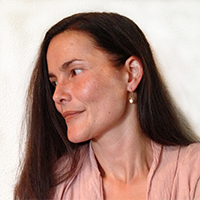Tom Howard/Margaret Reid Poetry Contest 2021
Congratulations to the winners of the 2021 Tom Howard/Margaret Reid Poetry Contest!
Honorable Mention $200
- Maurya Kerr, for, Poetry
- Fiona Lu, portrait of mother as nüwa, Poetry
- Tawanda Mulalu, Aria, Poetry
- Scudder Parker, The Poem of the World, Poetry
- Peaco Todd, Morning in the YMCA Pool, Poetry
- Taylor Byas, Nikon Coolpix, S210, Traditional Verse
- Athena Kildegaard, Room in the Bag of Stars, Traditional Verse
- Remi Recchia, Ghazal for the Bumps on My Spine, Traditional Verse
- Laura Theis, Six Things Taygete Had To Learn Without Being Taught, Traditional Verse
- Laura Villareal, Afterwards, Traditional Verse
Judge Soma Mei Sheng Frazier comments on the winning entries
In November, a strange tree flowered in a New York courtyard after bracing winds had stripped the others bare. Spotting it from my office window, I yanked a coat on and strode outside to find that each vivid blossom was a colorful index card affixed with bright yarn. On tiptoe, I clasped a branch, pulling its purple flower close. "Poetree", the card read, and when I flipped it over, there was a poem. In the biting wind, I circled the tree—reading yellow poems, pink poems, red poems—for half an hour, joined by curious passers-by. Fat snowflakes turned my wind-whipped hair white. My fingertips numbed. My eyes stung. Yet I was warm. All of us, meeting one another's eyes, were warm.
US Poet Laureate Emeritus Juan Felipe Herrera once said, "Poetry is a call to action, and it also is action." A masterful poem changes the dialogue by changing the people in dialogue, and adjudicating this year's competition has certainly remade me. 4,593 entries were submitted, seeding branching neural pathways. Flowering in the cold. Lending vibrancy and warmth.
This year's entries were meticulous, treacherous, delicate, dicey and more. Lines that did not ultimately find their way into the list below—about those who have known hunger leaving morsels for birds, about Zora Neale Hurston asking for her oyster knife, about buttercups and bone marrow and a golden tooth—will never leave me.
But it is my beautiful, harrowing job to cut and prune. So, let us circle this curious collection together. Pull each poem close, and let it change you.
The Winners
"Bastards' Tongue" by Qin Qin
Tom Howard Prize for verse in any style
Dragged on a museum field trip as a kid, I rounded a corner to face a riot of color, texture and composition. It was the first painting—enormous, abstract, unforgettable—to stop me midstride and hold me in place, left behind by my classmates. "Bastards' Tongue" leverages abstraction in the same gripping way. Stripped of anything overwrought, the poem lays intersecting struggles bare: history versus erasure, identity versus authenticity, and the mashup of "-ations" that comprise who we are. Nation, assimilation, bastardization. Negotiation, debilitation, consolation. Demarcation, reclamation, transformation. And in small ways, if we are fortunate, liberation.
"afro/latin/a" by Edythe Rodriguez
Margaret Reid Prize for verse that rhymes or has a traditional style
Maps in an atlas of ghost towns, spices in a recipe, items in a moral inventory: a list poem deconstructs its subject by cataloging individual components. And in "afro/latin/a", each component (like each list item in Whitman's "Song of Myself") contains multitudes. Sometimes straightforward, often allusive, these lines span continents to agitate, elucidate and amaze. Occasionally, catching some formative song from my young adulthood on the oldies station, I'm made suddenly aware that what constitutes "traditional" is incessantly shifting. It is a peculiar and bittersweet comfort, then, to note the ways in which today's innovative poets pay homage to tradition. In this list poem, Rodriguez is meticulous with regard to diction and form—employing anaphora and litany to connect dovetailing aspects of the speaker's identity. Like any conventional poem, this piece is above all soundly-structured, its stanzas held together with internal and slant rhyme, its imagery forged from history, its symbols and allusions stacked perfectly to underpin the final line's direct address.
Honorable Mentions: Tom Howard Prize
"for" by Maurya Kerr
For hours, days, weeks, I didn't stop thinking about "for". Several nights, rather than pressing forward in my reading, I doubled back to reread it and, afterward, could not sleep for the visions it had spilled into my psyche: "for knowing he must have fallen forward as the shot hit his heart when we lie on our stomachs, for seeing him blown backwards by the bulleted blast when we lie on our backs." This poem is not written in traditional elegiac couplets—but its arrestive lines snuck into my bones and burrowed into my belly till I mourned its subject too, which is what, I think, elegies are for.
"portrait of mother as nüwa" by Fiona Lu
In this lovely and wrenching poem, as in Chinese mythology, it is a mother's hands—"hands like silk, voice / like a bright, clear window of light"—that mold humanity in her own image. That patch the holes and mend the pillars after heaven's collapse, extinguishing blazes and repurposing the cinders to staunch torrential floods. But what if she is then forgotten? Forfeited? Left to shiver in bed at night? For the myth of Nüwa also warns that even a goddess may grow tired and haphazard. "portrait of mother as nüwa" explores what happens when the patches give, the mending unmends, the goddess bleeds and recedes.
"Aria" by Tawanda Mulalu
In opera, the aria captures a moment, an emotion, a story in one voice. Often, it is preceded by a recitative that provides contextualization and justification. But this poem needs no justification: America is its recitative, sung in speech and action, leading "Aria" to pour out in deep, resounding notes and elaborate poetic coloratura. As you read, consider the intentionality of the poem: its rhythm, inevitable logic, and its shape. Consider the couplet that breaks the poem's visual pattern, drawing one gun on the page and another from an officer's holster. Consider, too, how a single voice may speak for many whose words are locked behind clenched jaws.
"The Poem of the World" by Scudder Parker
What kind of literary badass has the nerve to title a poem "The Poem of the World", and the skill to deliver on such a lofty promise? A poet you will suddenly trust. One who'll help you wake in your own body; lead you through the forest, following the soft sound of "a doe's hoof tapping ice / till she can drink" and, with grace and subtlety and some sort of poetic wizardry, show you the bright, perfect bodies of birds heard, but yet unseen.
"Morning in the YMCA Pool" by Peaco Todd
These vibrant quatrains float, at once heavy and weightless, between form and freedom, imagery and philosophy, vitality and mortality, "for a few minutes defying the gravity / that is pulling the very flesh from the bone." While the promises painted on this poem's walls are not for everyone, "Morning in the YMCA Pool" is. It is for those who are still seeking and those who have their answers. It is for anyone who swims because it feels like flying.
Honorable Mentions: Margaret Reid Prize
"Nikon Coolpix, S210" by Taylor Byas
There is something deeply satisfying about a poem that starts and ends in one place, as though pulling us out the backyard gate on an adventure and returning us safely home again. Better, still, is a poem that frames, focuses and filters a realization for us. "Nikon Coolpix, S210" does both—illuminating adolescence, objectification and power in a bright flash of a pantoum; zooming in and serving as another set of eyes.
"Room in the Bag of Stars" by Athena Kildegaard
Here's how you fashion a golden shovel: borrow another writer's line. Use each of its words consecutively as an end word in your own poem. Credit the original writer. Here's how you fashion a golden shovel sestina: study the work of astoundingly brilliant writers like Ursula K. Le Guin until you, yourself, become an astoundingly brilliant writer. Close your eyes and see "the blow torch on ice in / winter, sponges of tepid water, the stiff bag / of clothespins, the empty bottles and the / man, our father." Continue developing vivid imagery in mesmerizing rhythm and near-rhyme, fashioning a golden shovel that doubles as your sestina's first stanza. Use your shovel to dig deep, deep, deep till you strike stars.
"Ghazal for the Bumps on My Spine" by Remi Recchia
A doctor's cool hand tracing over the speaker's spine like a box turtle swimming through algae and flower, a To Do list mentioning caskets, church hymns and burning flowers: each singular and staggering facet of "Ghazal for the Bumps on My Spine" makes modern, makes malleable, an ancient and demanding poetic form.
"Six Things Taygete Had to Learn Without Being Taught" by Laura Theis
In "Six Things", the daughter of Atlas visits us as a doe and a star, the hunter and the hunted, delivering a list of fundamental truths and warnings. For millennia, poets have tapped Greek mythology—but this poem does so on its own terms, writing its own cautionary rules, always one step ahead as Taygete herself was: "here and then here and then gone".
"Afterwards" by Laura Villareal
Contrapuntal: the word itself is as intellectual, as intimidating, as the poetic form. But in music, "counterpoint" is simply a relationship: a harmonic interdependence between rhythmically and melodically self-contained lines. "Afterwards" smoothly laces matchless lines, images and whole poems together in one compositionally stunning piece for us to enter, explore and harmonize with—like birds beating a lullaby in the mud nest of the speaker's body.
Read our press release about the winners.
Learn more about the Tom Howard/Margaret Reid Poetry Contest.
Contest Judges

Soma Mei Sheng Frazier
Soma Mei Sheng Frazier is the final judge of our Tom Howard/Margaret Reid Poetry Contest. Soma's third prose chapbook, Don't Give Up on Alan Greenspan, was selected as the winner of CutBank's 2018 contest and released in 2019. Her previous fiction chapbooks—Salve (Nomadic Press) and Collateral Damage: A Triptych (RopeWalk Press)—earned praise from Nikki Giovanni, Antonya Nelson, Sarah Shun-lien Bynum, Molly Giles, Michelle Tea, and others. In 2015 she founded COG, a multimedia literary publication that she ran with her undergraduate students at Cogswell, which has featured Dave Eggers, Opal Palmer Adisa, Gish Jen, Denise Duhamel, and many more. Read this selection of poems and listen to her read with other Nomadic Press authors on KPFA 94.1 FM. Read Soma's brief Glimmer Train essay on literary craft.
Soma recently relocated from California to New York for a professorship at SUNY Oswego. Her sweet tooth demands sugar in everything but literature. She is now busy revising a novel.
Contest Judges

Vernon Keeve III
Vernon Keeve III (Trey), assistant judge of our Tom Howard/Margaret Reid Poetry Contest, is a Virginia-born writer, living and teaching in Oakland. They hold an MFA from California College of the Arts and an MA in Teaching Literature from Bard College. Their full-length collection of poetry, Southern Migrant Mixtape, was published by Nomadic Press and received the PEN Oakland Josephine Miles Award.
Contest Judges

Lauren Singer
Lauren Singer is an assistant judge of our Wergle Flomp Humor Poetry Contest and North Street Book Prize, and a past judge of our Tom Howard/John H. Reid Fiction & Essay Contest. She is a native New Yorker living in Western Massachusetts. Her poetry has been published in Nerve House, Bareback, Feel the Word, Read This, Kosmosis, One Night Stanzas, and other literary magazines across the country. An attendee of the New York State Summer Writer's Institute, she is a graduate of Bard College at Simon's Rock and received her MSW at the University of Chicago in 2015. She has self-published three chapbooks and received an honorable mention in the 2011 Wergle Flomp contest. In addition to her creative interests, Lauren works as a sex and relationship therapist and runs a private practice out of Northampton, MA. Her book-length poetry manuscript, Raised Ranch, will be published by Game Over Books in April of 2025. She prides herself on her wealth of useless pop culture knowledge, namely of nineties R&B lyrics, and she can pretty much quote "The X-Files".









